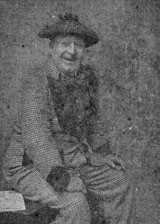Annotation:McFarlane o' the Sproats o' Burnieboozie: Difference between revisions
No edit summary |
m (Text replacement - "garamond, serif" to "sans-serif") |
||
| (One intermediate revision by one other user not shown) | |||
| Line 1: | Line 1: | ||
=='''Back to [[{{BASEPAGENAME}}]]'''== | =='''Back to [[{{BASEPAGENAME}}]]'''== | ||
---- | ---- | ||
<p><font face=" | <p><font face="sans-serif" size="4"> | ||
'''McFARLANE O' THE STROATS O' BURNIEBOOZIE.''' Scottish, Air ("Bothy Ballad") (2/4 time). G Major. Standard tuning (fiddle). AB. The music was probably written by singer and songwriter Willie Kemp [http://en.wikipedia.org/wiki/Willie_Kemp] (1888-1965), with words by G.B. Thomson, about a man who sends his friend MacFarlane to court a girl on his behalf. It is | '''McFARLANE O' THE STROATS O' BURNIEBOOZIE.''' Scottish, Air ("Bothy Ballad") (2/4 time). G Major. Standard tuning (fiddle). AB. The music was probably written by singer and songwriter Willie Kemp [http://en.wikipedia.org/wiki/Willie_Kemp] (1888-1965), with comic words by G.B. Thomson, about a man who sends his friend MacFarlane to court a girl on his behalf. It is a 20th century 'bothy ballad' [http://www.educationscotland.gov.uk/scotlandssongs/about/songs/ballads/bothyballads/index.asp], or a song composed and sung by laborers at the end of the 19th century. These laborers were itinerant workers who lived for an agricultural season in small rooms, called bothies, which were sparse and bare with only the simplest of furnishings.<br> | ||
<br> | <br> | ||
[[File:kemp2.jpg|200px|thumb|left|Willie Kemp]] | [[File:kemp2.jpg|200px|thumb|left|Willie Kemp]] | ||
| Line 13: | Line 13: | ||
</blockquote> | </blockquote> | ||
</font></p> | </font></p> | ||
<p><font face=" | <p><font face="sans-serif" size="4"> | ||
''Source for notated version'': | ''Source for notated version'': | ||
<br> | <br> | ||
<br> | <br> | ||
</font></p> | </font></p> | ||
<p><font face=" | <p><font face="sans-serif" size="4"> | ||
''Printed sources'': Hunter ('''The Fiddle Music of Scotland'''), 1988; No. 364. Neil ('''The Scots Fiddle'''), 1991; No. 72, p. 96. | ''Printed sources'': Hunter ('''The Fiddle Music of Scotland'''), 1988; No. 364. Neil ('''The Scots Fiddle'''), 1991; No. 72, p. 96. | ||
<br> | <br> | ||
<br> | <br> | ||
</font></p> | </font></p> | ||
<p><font face=" | <p><font face="sans-serif" size="4"> | ||
''Recorded sources'': <font color=teal>Beltona Bel 1457 (78 RPM), William Kemp (1929). Borealis Records, Enoch Kent - "One More Round" (2008). Lismor Records, Andy Stewart - "Back to the Bothy" (1988). | ''Recorded sources'': <font color=teal>Beltona Bel 1457 (78 RPM), William Kemp (1929). Borealis Records, Enoch Kent - "One More Round" (2008). Lismor Records, Andy Stewart - "Back to the Bothy" (1988). | ||
</font> | </font> | ||
Latest revision as of 14:20, 6 May 2019
Back to McFarlane o' the Sproats o' Burnieboozie
McFARLANE O' THE STROATS O' BURNIEBOOZIE. Scottish, Air ("Bothy Ballad") (2/4 time). G Major. Standard tuning (fiddle). AB. The music was probably written by singer and songwriter Willie Kemp [1] (1888-1965), with comic words by G.B. Thomson, about a man who sends his friend MacFarlane to court a girl on his behalf. It is a 20th century 'bothy ballad' [2], or a song composed and sung by laborers at the end of the 19th century. These laborers were itinerant workers who lived for an agricultural season in small rooms, called bothies, which were sparse and bare with only the simplest of furnishings.

The first chorus goes:
I dinna like McFarlane, I'm safe enough tae state,
His lug would cast a shadow ower a sax fit gate;
He's saft as ony gorblin and sliddery as a skate,
McFarlane o the Sprots o Burnieboosie.
Source for notated version:
Printed sources: Hunter (The Fiddle Music of Scotland), 1988; No. 364. Neil (The Scots Fiddle), 1991; No. 72, p. 96.
Recorded sources: Beltona Bel 1457 (78 RPM), William Kemp (1929). Borealis Records, Enoch Kent - "One More Round" (2008). Lismor Records, Andy Stewart - "Back to the Bothy" (1988).
